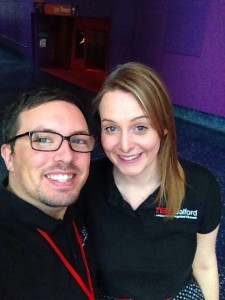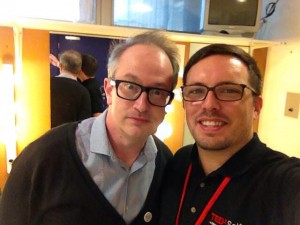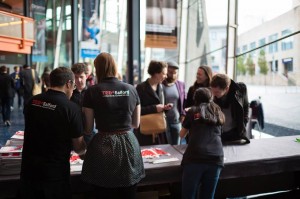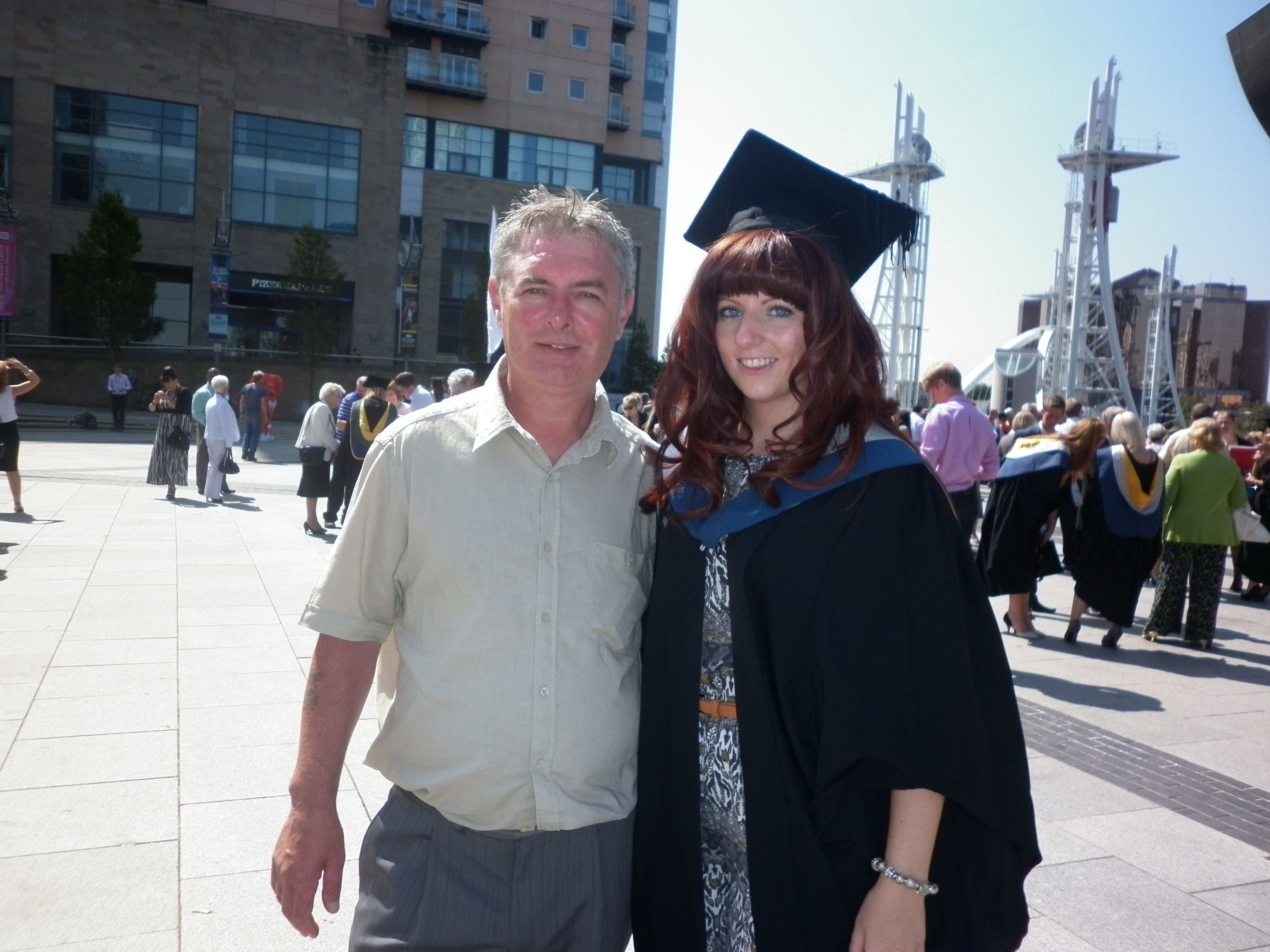By Nikki Street and Tom Mayers

The SalfordPsych Engagement Team asked if I (Nikki) could write a blog after spotting some photos of me volunteering at TEDxSalford this year. I of course said yes, who wouldn’t want to write a blog (?!) but immediately invited my friend Tom on board. Whilst I can take some credit (and the benefits) for volunteering on the day, Tom has been a part of the TEDxSalford team and blogging for them for over 2 years now. We have written this post together to explore our different experiences and highlights from the day.
Two years ago, we were delegates at TEDxSalford 2012 and found the whole thing so inspirational. We are both Psychology graduates and even though our research interests are pretty different, we both enjoy the TED events. Another similarity between us is that we volunteered for different organizations during our undergraduate Psychology studies. I volunteered and continue to volunteer at the Samaritan’s offering emotional support to people struggling to cope and training for new volunteers. Tom volunteered at the Manchester probation service and is now working for the organisation full time in a job he loves.
You might have heard of TED before, or watched hours of these amazing lectures online. The pretense is to give an 18 minute talk with the aim to inspire. TEDxSalford is a locally organized event bringing people together in Salford to share their work and ideas. Mishal Saeed is the Curator and Licensee for TEDxSalford and also a previous President of the University of Salford Student Union. TEDxSalford is now the largest independent TEDx organization in the UK.
What was our best part of TEDxSalford this year?
Nikki – A noble peace prize-winner, a teenage nuclear scientist and a psychoanalyst walk into the Lowry…I know this sounds like the start to a very strange joke but this is the reason why I loved volunteering for TEDxSalford so much. The event brings together so many different people from different backgrounds. Being part of the team meant I met many of the speakers, which really highlighted how they are just ordinary people doing extraordinary things – their stories show the goodness in the world!
I can’t pick one talk that I enjoyed the most, but my 3 favourite were:
- Tawakkol Karmen, the Noble Peace Prize winner for her peaceful protests and non-violent attempts towards peace building and women’s rights in Yemen. Listening to her talk and hearing (and being part of) the longest standing ovation on TEDxSalford record gave me goose pimples. She is an inspiration human being. Fact.
- I heard, from the side of stage, Sophia Wallace speaking about her artwork ‘Cliteracy’. Once I got over the repeated taboo word ‘clit’, a word that, according to Sophia, has become needlessly taboo I listened to the message. Whilst male sexuality is often discussed and widely acknowledged, female sexuality is often limited to menstruation and reproduction. We need to rethink women’s sexuality, particularly in sex education. Vagina literally means sword holder and Sophia’s artwork tries to ask questions about this ingrained inequality in our society.
- Lucy Hawking was also a highlight, she tries to break down the barriers of communication and science using children’s stories to engage and identify with children living lives not represented in ‘standard’ family dynamics. Although I only managed to catch the end of her talk, it was definitely in my top 3 of the day!

Tom- I am a big fan of Robin Ince. Both Nikki and I have been to see him twice at the Lowry theatre over the years and we both listen to his BBC Radio 4 show with Professor Brian Cox “The Infinite Monkey Cage”. I mithered, badgered and queried until I was allocated as Ince’s speaker liaison for the day. I was responsible for making his TEDxSalford experience as comfortable and as easy as possible. It was great to converse with him on a wide variety of subjects. Even more amazing was that Ince needed to get to Piccadilly station quickly after his talk and the best scenario was for me to take him in my car. Imagine having your hero in the front seat of your car! As amazing as the experience was, it was also one of dread as I didn’t really know how to get to the station! I had to “be cool”, as if this was a normal experience. I had to actively listen to what Ince was saying and respond accordingly, read the road signs, try not to crash and get to the destination in one piece. Needless to say, we did get there, on time and in one piece. Who says men can’t multitask?
What was our take away from the experience?
Nikki- Working on the ticketing team throughout the day, we saw pretty much everyone attending the event. The mix of attendees astounded me with parents, children, students, and all the people in between. TED brings together a range of people and I believe that is the beauty of the event. My main takeaway of the day was how spreading ideas about science in different ways is particularly important (children, art & individual stories). I believe in the power of interdisciplinary collaborations in science and this is where some of the best work happens. Jack Sim a.k.a. ‘Mr. Toilet’ in his 18 min slot reflected on his rationale for trying to make a difference by highlighting the importance of proper sanitation in a society. Jack Sim worked out on average how many days he had to live and wanted to do something useful with the rest of his days. Following this, I found myself working out my average days left in my life. In the UK life expectancy for women is 82.3 years and 78.2 years for men- on this logic I have 20,160 days left to live and the day made me determined to fill them with meeting my own goals and strive to help others.
Tom- Besides taking away the memories of meeting interesting people such as Lucy Hawking, Jack Sim and Robin Ince, one of the positive impacts of being involved with TEDxSalford is the skills that the opportunity develops. Throughout my two year experience as a volunteer, I have developed many skills and experiences such as: writing articles, editing, writing code, marketing, event management, and communicating with high profile individuals to name a few. The above skills and experiences are things that I probably wouldn’t be able to develop in a normal full-time role, perhaps because TEDx isn’t a normal voluntary opportunity. But it is one I would actively encourage someone to get involved with.
Everybody has his/her own TED talk- what would you say?
Nikki- I don’t think anyone has seen or been to a TED event and not considered what they would say in 18 minutes to inspire. My research based in empirical aesthetics has ties with many areas of psychology including perception, cognition and environmental psychology. Whilst investigating the power of art and beauty was once a main domain of psychologists but has fallen out of favour partly because of the associated experimental difficulty. I believe the Arts and Science should be reunited to engage and inspire others and change the stuffy perception of science into the more accessible field of Art. I am particularly interested in using art as science communication to make research accessible to everyone.
Tom-Of course, if something disastrous happened within TEDxSalford and as a matter of last resort the curators said to me “Tom, you’re going to have to talk for 10 minutes, we’re desperate!”. There is a lot I could probably talk about, although, I am very passionate about education and the concept of intelligence. As a psychology student at university, I became interested and passionate about the concept of intelligence, especially in relation to how creativity plays a role. Personally, I believe that creativity is equally important to the role of intelligence as academic abilities like mathematics. Without creativity, our knowledge is useless as we would not know how to use it constructively or think in abstract ways. Behind every great human achievement whether it is the wheel, pyramids, medicine or technology, creativity worked hand in hand with classical characteristics associated with intelligence. At university, I was attracted to reading around Gardner’s theory of Multiple Intelligences and believe that creativity has a seat at the table of intelligence. This interest also helped shape my first ever article for TEDxSalford which can be found here.
 Inspired to become a TEDxSalford volunteer?
Inspired to become a TEDxSalford volunteer?
Driving home pumped and full of inspiration, we can’t highlight enough the enjoyment of our day volunteering at TEDxSalford. It really was a festival of the mind and trying to turn off that inspiration to get to sleep was a challenge. Volunteering at TEDxSalford certainly fits the brief and spirit of the event “ideas worth spreading”.
If you think volunteering at TEDxSalford is something you might be interested in, keep an eye on the website or follow on twitter (@TEDxSalford) for updates. If you are thinking about volunteering in any area we would urge you to go for it! The benefits and experiences gained in volunteering such as meeting people you would never encounter, building your confidence and career prospects in the future can’t be underestimated!
Our twitter names…

